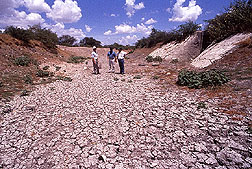This page has been archived and is being provided for reference purposes only. The page is no longer being updated, and therefore, links on the page may be invalid.
|
|
Sustaining Texas Agriculture During DroughtBy Jim De QuattroJanuary 24, 1997 A four-year drought has underscored the potential for new sustainable-farming systems to save money, soil and water--and to increase crop yields--for many south Texas farmers. A feature story in the January Agricultural Research magazine gives the details. To find out how to get the entire article, see the note at the end. The story tells how scientists with the Agricultural Research Service developed and tested the first conservation tillage systems designed for growing cotton, sorghum and corn in the semiarid, subtropical Lower Rio Grande Valley of Texas. Keys to conservation tillage are to leave crop residue on the surface and to reduce deep plowing of the soil. These tactics reduce wind and water erosion. They also conserve moisture in the soil. This is a critical benefit--especially since drought has meant inadequate rainfall and restricted irrigation in many areas of Texas and northern Mexico. Field tests since 1993 indicate the scientists’ new conservation tillage systems can increase net returns $30 to $50 an acre, partly by reducing fuel and labor costs. Cotton, sorghum and corn account for about half the typical annual $400 million value of all crops grown in the Lower Rio Grande Valley. While relatively few of the growers use conservation tillage today, the drought--and the scientists’ research results--are rapidly changing minds. The article, “Sustaining Agriculture in Drought Years,” is accessible on the World Wide Web at: /is/AR/archive/jan97/contill0197.htm Scientific contact: Joe Bradford and Jim Smart, USDA-ARS Subtropical Agricultural Research Laboratory, Weslaco, Texas, phone (210) 969-4812 |

